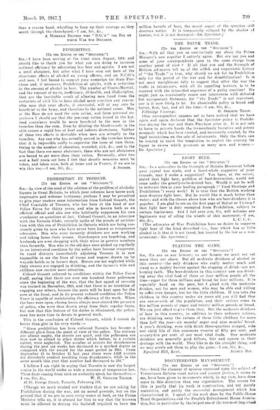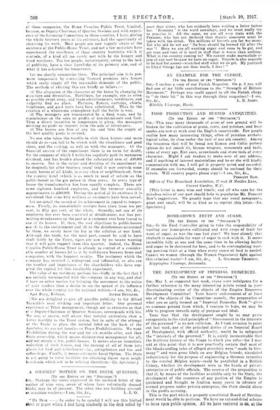DISINTERESTED MANAGEMENT.
(To THE EDITOR OP THE " SPECTATOR.") Sm,—Amid the clamour of opinion expressed upon the subject of Temperance Reform scant notice and scanter justice, it seems to me, have been given to movements which, in my view, have done more in this direction than any organization. The reason for this is partly that its work is constructive, and not merely restrictive, and partly the successful management which has characterized it. I speak of the work done by the Public-House Trust Organizations and the People's Refreshment House Associa- tion, but in particular by the largest one of the two moat lmportan' of those companies, the Hanle Counties Public Trust, Limited, because, as Deputy-Chairman of Quarter Sessions and with experi- ence of the Licensing Committees in three counties, I have, during the whole fourteen years of its existence, had the opportunity of observing its work. Most people are now vaguely aware of the existence of the Public-House Trust, and not a few motorists have experienced the excellence of those country hostelries which it controls, of a kind all too rarely suet with by the hungry and tired wayfarer. Too few people, unfortunately, owing to the lack of publicity, have a clear knowledge of its primary aim,- and of what it has achieved for temperance.
Let me shortly summarize these. The principal aim is to pro- mete temperance by converting licensed premises into houses which really supply all the reasonable demands of the public. The methods of effecting this are briefly as follows:—
(1) The alteration of the character of the house by changing its structure and decoration. Partitions, for example, are as often as possible swept away, and trade advertisements, tawdriness, and
vulgarity find no place. Pictures, flowers, curtains, chintz, brightness, and good taste have been substituted. Thus by the creation of a wholesome atmosphere half the battle is won.
-12) The managers are remunerated by a fixed wage, and by commissions on the sales or profits of non-intoxicants and food. Thus a direct incentive to temperance is given, the managers deriving no profit or interest from the sale of intoxicants.
43) The houses are free of any tie, and thus the supply of the best quality goods is secured.
No one who takes the trouble to visit these houses—and more should do so—can fail to be struck with the cleanliness and good cheer, and the cooking, as well as with the managers. Of the financial emcees of the experiment there is no room for doubt, for the company of which I write has regularly paid its maximum dividend, and has besides placed the substantial sum of .210,000 to reserve. Nor is the extent and duration of its experiment to be despised; for after fourteen years' trial it now controls some ninety houses of all kinds, in (eery class of neighbourhood, from the country hotel (which is as much in need of reform as the public-house) to the gin palace in slum areas. In every type of house the transformation has been equally complete. There are some eighteen hundred employees, and the turnover annually approximates to £300,000. During the period of its existence it is calculated that some fifty millions of customers have been served.
Let me detail the record of its achievement in regard to temper- auee. Firstly, its non-alcoholic receipts have risen from ten per tent. to fifty per cent. of the whole. Secondly, not one of its employees has ever been convicted of drunkenness, nor has per- mitting drunkenness on the part of a customer ever been traced to one of its houses. If, then, the root objections to public-houses are tl) to the environment and (2) to the drunkenness occasioned by them, we surely have the key to the solution at our hand. Although the trade, for the most part, cannot be said to have dealt fairly by the Trust, signs are now by no means wanting that it will gain support from this quarter. Indeed, the Home Counties Public-House Trust is already in control of a consider- able number of houses let to it by well-known brewery firms and companies, with the happiest results. The testimony which the company has received h widespread and influential, as also are the number and importance of the shareholders who have sup- plied the capital for this invaluable experiment.
The value of my testimony perhaps lies chiefly in the fact that I am entirely unconnected with the company in any way, and that I have no other motive for bringing the movement to the notice of your readers than a desire to see the spread of its influence ater the whole country fur the national welfare.—I am, Sir, rie.,
[We are delighted to give all possible publicity to Sir Alfred Reynolds's most striking and important letter. Our personal experience of Trust management, though not so extensive as that of a Deputy-Chairman of Quarter Sessions, corresponds with his. We are, of course, well an-are that teetotal extremists show a Litter hostility to the Trust system, but in spite of the attempt of the Trade to place the teetotal label on the back of the Spectator, we are not fanatics or Peace Prohibitionists. We want Prohibition during the war and for six months after, and then Mate ownership, which means disinterested management for all, and not merely a few, public-houses. It means also an immediate reduction of such houses, and the turning of all of them into places for food and refreshment—i.e., eating-houses and tea- and coffee-shops. Finally, it means automatic Local Option. The State 14 not going to force facilities for obtaining liquor upon neigh- bourhoods which ask to be relieved therefrom.—ED. Spectator.]



































 Previous page
Previous page